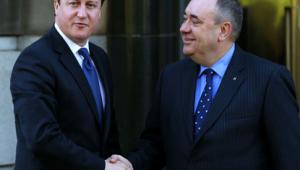The Scottish and UK governments today opened negotiations on the terms for a referendum on Scottish independence.
The talks took place amid signs that both want to put the rancour of recent months behind them and focus debate on substance rather than process.
First Minister Alex Salmond emerged from this morning’s meeting to report ‘modest progress’ and to confirm that further discussions would take place.
But he said there would be no formal agreement until after
completion of his government’s public consultation on the referendum plans. The
UK government is running a parallel consultation.
Scottish Secretary Michael Moore called the talks 'constructive' but said that a number of points of issue remain.
Salmond met Moore at the Scottish Government’s St Andrew’s House in Edinburgh, and will see David Cameron when the prime minister visits Scotland on Thursday. The aim is to agree terms for the poll to be run under an amendment to the Scotland Act, and so make the outcome legally binding.
Talks were postponed last month because Moore was unwell, and the delay has allowed some potential points of conflict to be managed out of active contention. London has signalled its acquiescence over Salmond’s plan to hold the vote in autumn 2014, while Salmond has accepted the principle of Electoral Commission oversight.
Initially, Salmond insisted on talking to Cameron rather than Moore, but Thursday’s encounter – described by Downing Street as a ‘courtesy call’ – seems to have defused that row. Scottish Ministers might also give ground on extending the vote to 16 and 17 year-olds, although Salmond still lists this as an outstanding issue.
Several difficult problems persist, notably the Scottish Government’s belief that Scots should be given an opportunity to express a view on fiscal autonomy within the UK – the so-called ‘devo-max’ option – as well as on independence or the status quo.
The talks took place as Westminster MPs announced an inquiry into the future of defence policy in the event of Scottish independence. The Commons defence select committee will examine the potential impact on jobs, contracts and the future makeup of the armed forces.
Scotland is home to the UK nuclear submarine force, which the Scottish National Party is pledged to remove, and Scottish firms have close to £2bn of defence contracts on their books. Salmond recently angered some military authorities by remarking that the UK government’s current defence review would leave Scotland with the level forces it would want to retain after independence.




















